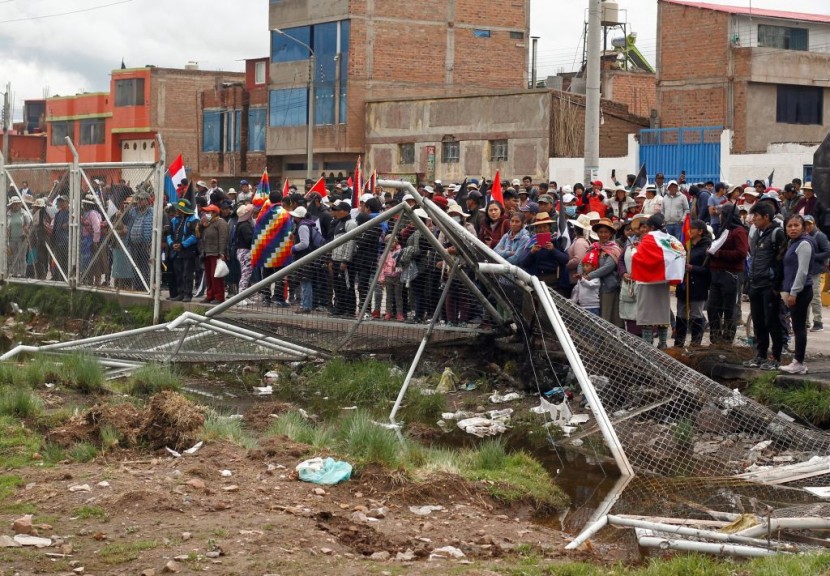
In Peru, about 50 people were injured Thursday after violent clashes between law police and anti-government protestors outside an airport, a month after 18 protesters were slain at the same spot.
The city of Juliaca in the Puno area of southern Peru had arranged a march to seek justice for the 18 citizens slain on January 9. However, it turned violent when demonstrators attempted to re-enter the Inca Mancoc airport.
Deadly Protests in Peru Continue
A local medical organization said 23 protestors were injured, including three youngsters, one of whom got a bullet wound to the leg. According to a tweet from the national police, 25 policemen were hurt in the fights.
Two months of protests by former president Pedro Castillo's followers have rattled Peru. Castillo was impeached and incarcerated after attempting to abolish parliament and govern by decree. Protesters demand that Dina Boluarte, Castillo's successor, resign and that new elections be held, as per France24.
Hundreds of individuals marched to the Plaza de Armas in Arequipa, another city in the south. Further north, in the capital city of Lima, some 2,000 CGTP workers marched peacefully through the streets towards the tightly guarded Congress.
Hundreds of people had assembled in Juliaca for a march that included mourning cries, anti-government slogans, and protest shouts. Since the protests began, at least 47 citizens and one police officer have been murdered in national skirmishes, according to Peru's human rights ombudsman.
Protesters have blocked roadways, resulting in shortages of essential food products, gasoline, and other essentials in several regions of the nation. Per Reuters via MSN, early indicators show that Peru's economy and inflation have been negatively impacted by the continuous social unrest that has shaken the Andean nation since December, said the director of the central bank's economic research unit on Friday.
Protests over the December dismissal and imprisonment of former President Pedro Castillo have paralyzed the Andean nation, with scores killed in conflicts between protestors and security forces.
Boluarte Calls For Multiparty Discussions
Yet, Peru's unpopular Congress has resisted efforts to pass legislation that may hasten elections, a decision that has strengthened the protestors' determination. Any further discussion on the subject may be halted until August, according to The Guardian.
Beginning in February, the government increased and extended a state of emergency to encompass seven southern areas, including Madre de Dios, Cusco, Puno, Apurmac, Moquegua, and Tacna. Castillo's effort to gain power had little effect on the outrage over his removal, which sent shockwaves across his strongholds in the rural Andes and the city's poorest neighborhoods.
His supporters accuse the reviled legislature of plotting a coup against their leader, the son of illiterate peasant farmers and the first member of the country's rural poor to be elected president. Despite the economic burden of the blockades, fury, and sadness over the deaths of protestors, largely at the hands of security forces, have galvanized the demonstrations.
Boluarte is Peru's eighth president in six years, a time marked by political instability and the terrible impact of the Covid epidemic, during which Peru's fatality rate was among the highest in the world.
Analysts have long discussed the Peruvian paradox - the combination of political turmoil and economic stability - but this contradiction may soon become obsolete. Peru's flawed political system would ultimately reduce foreign investment, which is crucial to the country's economy, and the situation is already deteriorating gradually.
Boluarte requested the international community to support the early elections in Peru, which she had previously delegated to Congress to organize. She also stated that any feasible solution must adhere to the Constitution, as per Merco Press.
In a video address to the Organization of American States (OAS), Boluarte encouraged all "friendly countries" to accept the plan to advance elections and reach a "peaceful" resolution to the present situation, which has resulted in the deaths of around 50 people. Boluarte emphasized that free elections should aid Peru in determining its future.
Boluarte stated that she listened "with great attention" to the remarks of her colleagues at the Summit of the Community of Latin American and Caribbean States (Celac) in Buenos Aires and expressed appreciation for the professions of concern and solidarity with Peru.
During the Celac conference, Peruvian Foreign Minister Ana Gervasi expressed sorrow that certain governments "had not accompanied" Peru following the failed coup attempt of former President Pedro Castillo. Given the "terrible" violence, Chilean President Gabriel Boric Font stated that Peru needs a "course correction," while Mexico's Andrés Manuel López Obrador (AMLO), who did not attend the summit in Buenos Aires, called for a joint proclamation against "repression" and Castillo's liberation.
Related Article: Kim Jong Un Shows Off Daughter at Military Events
@YouTube
© 2025 HNGN, All rights reserved. Do not reproduce without permission.








